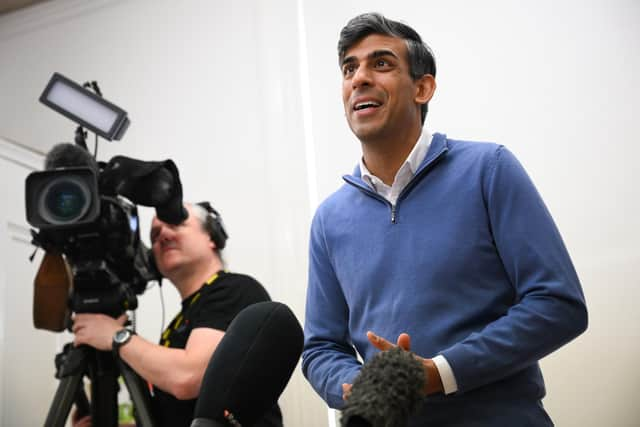The government possesses an absolute disregard for the impact of a cost of living crisis on consumers - Jayne Dowle
Council tax, road tax, broadband, mobile, water and even stamps, have all gone up from the first day of the month. For once, the energy providers are the good guys. Average household energy bills are to fall to their lowest point in two years after regulator Ofgem lowered its price cap in response to a drop in wholesale prices.
The price cap is dropping by 12.3 per cent, a decrease of £238 over the course of a year, or around £20 a month.
Advertisement
Hide AdAdvertisement
Hide AdDon’t hang out the bunting just yet. Soon we’ll be hit by some unforeseen catastrophe that sends gas and electricity prices soaring again.


Still, the sun’s coming out, isn’t it? Natalie Hitchins, head of home products and services at consumer organisation Which?, says there are ways to cut costs in the face of these price rises and keep household bills as low as possible. If you’re out of contract on broadband, pay TV and mobile phone providers, for example, she suggests you could swap providers and save up to £187 a year. You should also check if you’re eligible for any council tax exemptions or reductions. And perhaps, save money by installing a water meter – although many who’ve switched to a meter would beg to differ.
All these are good, practical suggestions, but excuse the pun – mere drops in the ocean. Plus, broad-brush suggested savings do not take into account personal circumstances and possessing the confidence to haggle.
It took me two weeks to get into the necessary combative frame of mind to enter negotiations with my mobile phone provider when my phone ran out of contract recently. It paid off; the monthly bill was slashed by more than half. But I’m still plucking up the strength to enter negotiations (again) with my energy provider, which wants to almost double my monthly payment in the middle of April.
Advertisement
Hide AdAdvertisement
Hide AdWhilst such tactics are well-advised, they shift the responsibility squarely onto the shoulders of the bill-payer and let the government off the hook. Keeping on top of everything is like having extra homework alongside regular responsibilities of job, family and running a house.
Obviously, individual companies and service providers are entirely at liberty to increase (or decrease) prices as they see fit. Government does have a limited span of intervention.
However, sadly, the government also possesses a seeming absolute disregard for the impact of a cost of living crisis that refuses to go away. How much longer can they refuse to address the elephant in the room, the one that is likely to cost the Conservatives the next election and is seeing many backbench Tory MPs stepping down in frustration?
The Prime Minister’s family wealth is well-documented, and he is well-insulated from the slings and arrows of consumer price rises in his manor house in Kirby Sigston, North Yorkshire (not to mention his London and Santa Monica, California properties).
Advertisement
Hide AdAdvertisement
Hide AdHe is not alone in this. If one thing typifies the last few years of Tory government, it is the growing divide between the unassailable rich and the rest of us. However, Mr Sunak is not a gilded tech entrepreneur or a property magnate; he is the Prime Minister of a country which is on its knees and will fall yet further if its citizens continue to be battered from all sides.
We haven’t even talked about the backdrop of mortgage rate rises which afflict millions and put the dream of home ownership further and further out of reach for younger people.
No-one would expect Mr Sunak to turn his back on his own wealth, but a little more compassion and understanding of the plight of others would not go amiss.
He and his Education Secretary, Gillian Keegan are on a theme this week – touting the roll-out of free childcare around the television and radio studios as if up to 15 hours a week of cost-free nursery provision for two-year-olds is the answer to all of the country’s economic woes.
Advertisement
Hide AdAdvertisement
Hide AdIt is helpful, yes, for parents of young children who want to work, but by no means a panacea.
It does absolutely nothing to address endemic poverty in areas where there are simply no suitable jobs for anyone, parent or not.
It does not even begin to touch the service of local government funding which is pushing councils to bankruptcy, nor question how mobile phone and internet companies can justify price rises for essential communications, nor acknowledge a sneaky 4 per cent rise in dental charges, meaning a standard check-up (good luck finding a dentist) will now cost £1 more, at £26.80.
Comment Guidelines
National World encourages reader discussion on our stories. User feedback, insights and back-and-forth exchanges add a rich layer of context to reporting. Please review our Community Guidelines before commenting.
